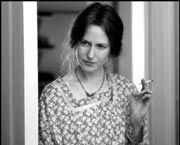he Hours is really three exquisitely crafted—but not quite connected—38-minute movies. In the first, Virginia Woolf (Nicole Kidman, almost unrecognizable in an excellent fake nose) writes her novel Mrs. Dalloway in the dull English suburbs to which her husband Leonard (Stephen Dillane) has exiled her in 1923 to quell the madness that will ultimately cause her river drowning (movingly depicted here) in 1941. This movie alternates with one about the more inexplicably suicidal 1950s housewife Laura Brown (Julianne Moore, even mousier than her comparable role in Far From Heaven) and one about a nondepressive single gal in a very now New York: Clarissa (Meryl Streep). Clarissa’s friends call her Mrs. Dalloway, and she’s preparing for a party, just like her namesake in the novel and the glum ’50s housewife. (The film opens Friday, Jan. 10 at Pacific Place.)
Director Stephen Daldry (Billy Elliot) neatly stitches the three stories together with clever cuts and the agreeably circling M�s strip of Philip Glass’ score, which resembles Bach after some intriguing brain disorder (Korsakoff’s Syndrome?) that leaves the compulsion to make intersecting melodies intact but shrinks the composer’s memory span to a one-minute window, obliterating larger structures.
In the Woolf movie, Kidman is a revelation. Actors take a big risk whenever they put anything on their faces: The Blues Brothers were cool, but Stanley Kauffmann was right to say they deprived themselves of the chief tool a comedian has when they hid their eyes behind shades. Kidman’s faux nose deprives her of that crinkly thing she does with it. She has a couple of deep grooves in her septum that, when the light hits them, help her achieve a characteristic note of sparkly, perky, coltish sexiness.
As Woolf, she strikes a wholly different note: grave, spectral, twitchy. The only smoldering thing is her deep voice. Sadly, David Hare’s adaptation of Michael Cunningham’s Pulitzer-winning novel doesn’t give her much of substance to say to explain her moods. He should’ve written more scenes with the punch of the one with Leonard as she tries to hop a train back to London to escape. It’s a dramatic confrontation, not an elliptical monologue, and it explicates her motives: to re-enter the realm of life and creativity, to risk all, to feel full again. Elsewhere the direction is too muted, subdued: Why don’t we get to hear the tormenting voices in her head, see some evidence of her demons? Movies usually err by overemphasis, Daldry by sins of omission. Even so, Kidman’s haunting gaze seizes and holds ours. At least three critics quipped that she wins The Hours‘ three-heroine acting contest “by a nose,” but she does it with her eyes and her voice.
The movie about Moore moping in the ’50s is still more nonspecific in its brooding. It’s good at showing how Mrs. Brown’s peppy hubby (John C. Reilly, fast becoming the Ralph Bellamy of our day) cluelessly misreads her misery, but there’s no psychological insight or social critique to show the significance of her suffering. The little boy who watches her despairingly prepare a birthday cake (Jack Rovello, whose dark eyes are like the “caves” of emotion Woolf sought to carve out behind her characters) cannot fathom what’s troubling her; neither can we. Moore is incapable of a less than artful performance, and everything about her world is beautifully rendered, but this character’s despair is less than intelligible and ultimately of scant dramatic use.
MY FAVORITE OF the three is Streep’s movie about the New Yorker Clarissa. What a haunted lark! What a gut-churning plunge! In a film with way too much stasis, Streep sweeps us along on a hectic day in the harried life of a book editor readying a dinner to honor her ex: distinguished author Richard (Ed Harris), who lives in a stark loft battling imaginary voices and their too-real cause, AIDS. This sequence of the film is the only one to achieve what Woolf aimed to do: give a sense of a woman’s entire life by depicting a single day. Clarissa’s every encounter—with her sardonic, saucily urbane daughter (Claire Danes); the live-in lesbian love of her life (Allison Janney); her ex’s shallow ex (Jeff Daniels); even the woman who runs the flower shop—deepens our understanding of her heart and her world. Harris is convincingly, bitterly half-sane as the writer who knows what it means when you get a major literary award for your life’s work: It’s over. With equal virtuosity, Streep shows what it means to be in the midst of life, carried away on, yet somehow negotiating, its eddying, surging stream.
As deftly as editor Peter Boyle joins them—Kidman puts her face to the water, then Streep’s face rises from the washbasin—the stories remain obdurately separate. Daldry’s intricate linkings suggest connections that are imposed upon each tale, instead of growing from them. When Woolf, Clarissa, and Mrs. Brown each have a passionate same-sex kiss, it works in the context of its own story, but fails as a link to the others. It’s just a sentimental clich頯f our time, used also by Todd Haynes: that gay love is a more authentic love, redeeming phony, empty hetero sex.
The Hours is unquestionably brilliant in all kinds of ways. Yet it is less than the sum of its parts, because they’re three parallel sets of sums, subtotals that never add up to a complete statement.









